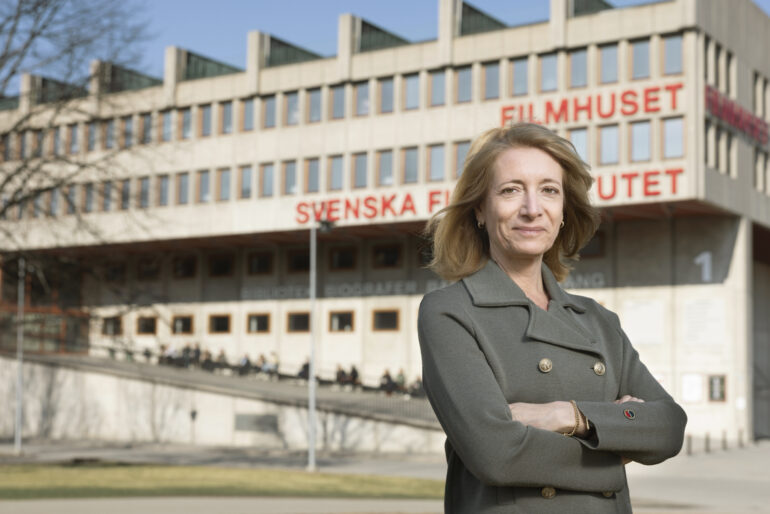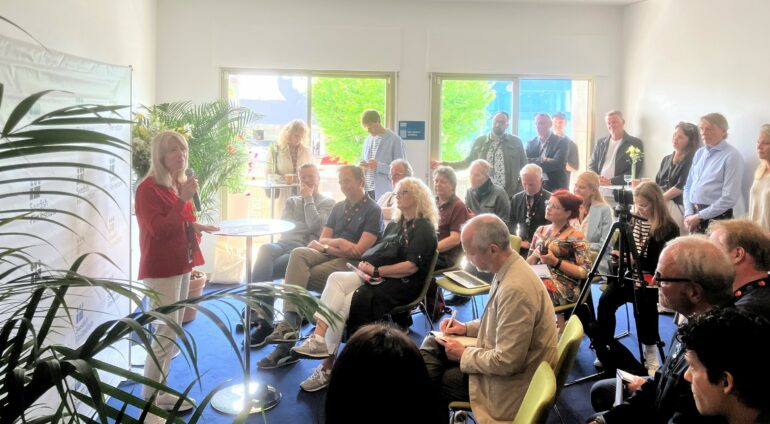Written by: Annika Pham
29.05.23
We sat down with Anette Novak, CEO at the Swedish Film Institute at the Cannes Film Festival to discuss her key focus areas and vision for Swedish film.
Last year was a record year for Swedish films in Cannes, and it was your first Cannes. What was your impression about this 2023 edition and on personal level, what kind of a learning curve was the past year for you?
Anette Novak: It’s been a huge learning curve. I have read reports and analysis, I have talked to hundreds of people and with every encounter, with every number, my understanding of film both as art and as business has broadened and deepened.
In Cannes this year, we have had the pleasure to introduce our new Chairperson of the Board, Gunilla von Platen – both to the business talks but also to the films, the creatives behind the films – and to the screenings.
Last year’s Cannes was amazing with the Palme d’Or for Triangle of Sadness, Best Script to Boy from Heaven and overall international attention for Swedish film. This year we had no film in competition, but the huge interest and curiosity about Swedish film persists with many requests from festivals. Ruben Östlund was also President of the Jury, which was the second time in history that a Swedish person received this honour, after Ingrid Bergman in 1973.
Could you update us on the burning issues that you are focusing on at the SFI?
AN: We are busy establishing a bridge between cultural policy and industry and commerce policy. Our guiding regulation is rooted in cultural policy, which stresses for instance artistic quality and strengthened participation. With the current international successes, there is a great opportunity to also deliver upon industry targets like attracting investment; this could be achieved by working closer with agencies under other ministries.
What do you think of the current film policy in Sweden?
AN: Many talented filmmakers backed by our existing support system, have had their break through internationally, so there is something right with this system. But more talent could be unleashed and now that the industry is being disrupted by artificial intelligence, across all segments of the industry, we have to act fast.
Could you expand on this issue?
AN: Absolutely. As discussed in Cannes, AI will impact our industry, from pre- to post-production, from rights management to distribution. It is being implemented as we speak and we are already receiving project proposals with AI. What we’re trying to do is attract attention to the fact that this could be a motor for the cultural and creative industry. The EU is pushing to use culture and creativity as a force for innovation and transformation of traditional industries, while creating a legal framework that would build trust and safety.
We need competence in this domain to assist and support the industry in the best way possible. There are so many opportunities to be explored: AI supported work-flow management, synthetic imaging, sound and images, IPR management and new distribution models.
I believe turning away from it isn’t the right call. On the contrary, we need to be part of this transition; be curious, learn, adapt – and I am persuaded we will then be able to enhance both creativity and productivity.
What are the steps now if you want to lift this topic on a political level and perhaps on a Nordic level?
AN: We are busy preparing a new arena where the Swedish film industry can meet and learn. Stay tuned for a save the date before the summer! The Swedish Film Institute will also propose that CCI’s – and the film and audiovisual industry in particular – be highlighted in the Swedish government’s coming research political proposition.
Last year the government finally introduced the much-awaited 25% filming incentives. Are you satisfied with this scheme, although the annual budget of SEK 100m is way below the SEK 300m that the industry had hoped for?
AN: These production incentives are the responsibility of Tillväxtverket, not the Swedish Film Institute. We have conveyed that if it is a levelling of competition in Europe that is the target, the budget needs to reach the European average of at least SEK 300m. If asked, we will continue to voice the fact that the budget should be increased.
How do you feel about Swedish films, still under-performing in cinemas in Sweden?
AN: It’s a bit too early to say if this is a post-Covid effect that is impacting cinema-going habits, or something that will stay. Is this the new normal? If this is the case, what does it mean in terms of funding, and what can we do?
When cinemas in the countryside are turning into more general cultural centres with a wider programming scope than just film screening, we might need to re-think our existing funding structure. Cinemas are important democratic and cultural arenas. But if the negative audience trend continues, the national film funding will not be enough. Perhaps other public funders need to step in. We are opening up the discussion with regions and municipalities and we experience a very good dialogue climate when we do.
What is your timetable to alert politicians and concretely take action?
AN: We have already, in our budget proposal for 2024, presented scenarios and awaiting an answer during the fall.
What’s the latest news regarding the implementation of the EU’s AVMSD (Audiovisual Media and Services Directive)?
AN: For now, politicians in Sweden have shown little interest in this issue, surprisingly. We try to lift the topic whenever we can.

